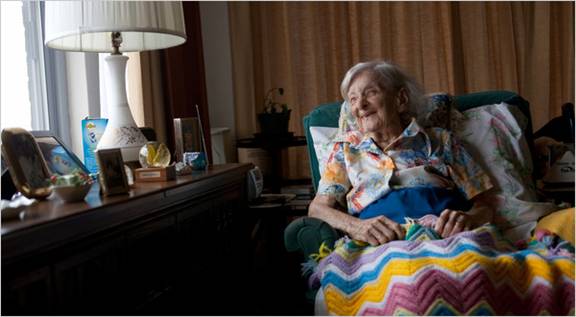|
At 99, Bronx Woman Still Hears Life’s Joyful Noises
New York Times
November 23, 2009

Sarah Gellert, 99, in her apartment. Twice widowed and with limited mobility, she says: “It's not my temperament to complain.”
Sarah Gellert’s favorite word is wonderful. Her parents and friends growing up in the Bronx were wonderful. Her two husbands were wonderful. Her friends from the company where she worked for more than four decades were wonderful.
Mrs. Gellert is 99 and counting, living alone in the Bronx with little family, almost no savings, and problems with her hearing, vision and mobility. But while many others her age are consumed with their limitations, Mrs. Gellert remains upbeat, the warmest person in the room.
“The fact that I’m here is a miracle,” she said, sitting by a window of her 21st-floor apartment, with a view of Long Island Sound in the distance. “It’s not my temperament to complain.”
Still, her cheerful disposition has been put to the test in recent years. Mrs. Gellert paid for her own 24-hour home care for several years until, in 2007, she exhausted her savings. Fiercely independent, she resisted applying for public assistance until a friendly neighbor persuaded her to reconsider.
The Jewish Association for Services for the Aged, a beneficiary agency of UJA-Federation of New York, which is one of the seven agencies supported by The New York Times Neediest Cases Fund, eventually stepped in and helped Mrs. Gellert apply for Medicaid and food stamps.
“A lot of clients don’t like Medicaid because they think it’s welfare, and they worked their whole life,” said Sima Musarskaya, her social worker from the agency. “But I told her, ‘You worked for your country, and now the country should work for you.’ ”
Medicaid covers almost the entire cost of Mrs. Gellert’s medical care, medicine and home care, including the services of Clara Edwards, who spends half the week with her. However, the program pays for only one hearing aid every five years, Ms. Musarskaya said, and Mrs. Gellert needed a new one for her left ear.
Without the second hearing aid, Mrs. Gellert was increasingly shut off from friends and family and found it harder to hear the television, speak on the telephone or listen to her favorite mystery books on tape.
“It was getting progressively worse,” she said, almost apologetically. “It was so upsetting.”
With $1,000 from the Neediest Cases Fund, Mrs. Gellert was able to get another hearing aid this month. A few days later, she regaled visitors with stories of her career working in the billing department of a financial firm in Midtown Manhattan, where she was an expert at using a comptometer, a mechanical calculator often with 100 keys or more.
Few might revel in a daily commute to Manhattan from the Bronx, where Mrs. Gellert has lived her entire life, but she did. She told visitors to her apartment that she loved taking the Lexington Avenue line to work because she had so much time to read.
“You know what’s great,” she added, “is that some of my underlings are still my friends.”
Her first husband, who worked at times for his family’s bakery, served in the military and died from cancer in 1949. The wife of the rabbi at her temple introduced her to her second husband, “a doll,” according to Mrs. Gellert. They were married in 1951 and traveled often to Europe.
Eventually, they became early residents of Co-op City, where Mr. Gellert wrote for a local newspaper. Since he died in the 1970s, she has continued to make her home there.
All of Mrs. Gellert’s 10 siblings died in miscarriages or at very young ages. She has two stepdaughters, a granddaughter and a brother-in-law, who lives in Florida. She keeps in touch with them, as well as friends, including one from kindergarten.
“When you make a friend, you have one for life,” she said.
With her new hearing aid, Mrs. Gellert feels comfortable enough to go out again, and plans to attend a Thanksgiving party in her apartment complex. There, she is likely to charm her neighbors.
“A lot of people who lost friends and have medical problems, they get depressed,” said Ms. Musarskaya, the social worker. “But Sarah has a very positive attitude. I don’t feel she’s 99. She’s more like 50.”
More Information on US Elder Rights Issues
Copyright © Global Action on Aging
Terms of Use |
Privacy Policy | Contact
Us
|



